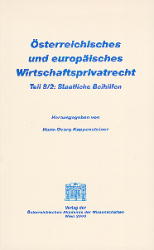
Gemäß Art 88 Abs 3 Satz 3 EG-V ist es den Mitgliedstaaten untersagt, Beihilfevorhaben vor einer Genehmigung durch die Kommission durchzuführen. Nach der Rechtsprechung des EuGH ist das Durchführungsverbot sowie das (durch eine Kommissionsentscheidung konkretisierte) materielle Beihilfeverbot unmittelbar anwendbar. Es handelt sich damit um Rechtsnormen, deren Missachtung rechtswidriges Verhalten nach nationalem Recht darstellt. Welche Rechtsfolgen ein Verstoß gegen diese Vorschriften im nationalen Recht nach sich zieht, ist gemeinschaftsrechtlich jedoch nicht im einzelnen geregelt. Da Beihilfen in Österreich vorwiegend privatrechtsförmig vergeben werden, untersucht die vorliegende Arbeit im Detail die Zivilrechtsfolgen gemeinschaftsrechtswidriger Beihilfevergabe nach österreichischem Zivilrecht. Dabei werden diese Zivilrechtsfolgen sowohl für das Rechtsverhältnis zwischen Beihilfegeber und Beihilfeempfänger (Nichtigkeit des Subventionsvertrags und bereicherungsrechtliche Rückabwicklung der Beihilfe), als auch für das Verhältnis zwischen diesen und Wettbewerbern des Beihilfeempfängers (Entstehen von Beseitigungs-, Schadenersatz- und Unterlassungsansprüchen) geprüft. Die Arbeit enthält in einem Grundlagenteil auch eine ausführliche Darstellung des materiellen Gehalts des Beihilfeverbotes sowie eine Beschreibung der wichtigsten Rechtsquellen in diesem Bereich.
…
According to Article 88 (3) Member States may not grant new aid before the commission has had the opportunity to examine the aid measure. The European Court of Justice has made clear that this provision is directly applicable. The same is true for the general prohibition of aid contained in Article 87 (1) once this provision has been applied to a specific aid measure by the commission in a formal decision. Direct applicability not only means that these provisions can be invoked by private parties in national proceedings, it also means that conduct in breach of these provisions triggers all legal consequences national law provides for unlawful behaviour in general. This study examines in detail the legal consequences brought about by an infringement of directly applicable state aid provisions.
Since aid in Austria typically is granted on the basis of contracts governed by private law, this examination focuses on the civil law consequences. The author both investigates the legal relationship between donor and recipient (i.e. nullity of the contract and recovery of the aid on the basis of the theory of unjust enrichment) and the relationship between these two parties and competitors as well as other third parties (in particular the availability of claims for damages and injunctive relief).
978-3-7001-2903-5
224 Seiten,
24x15cm, broschier